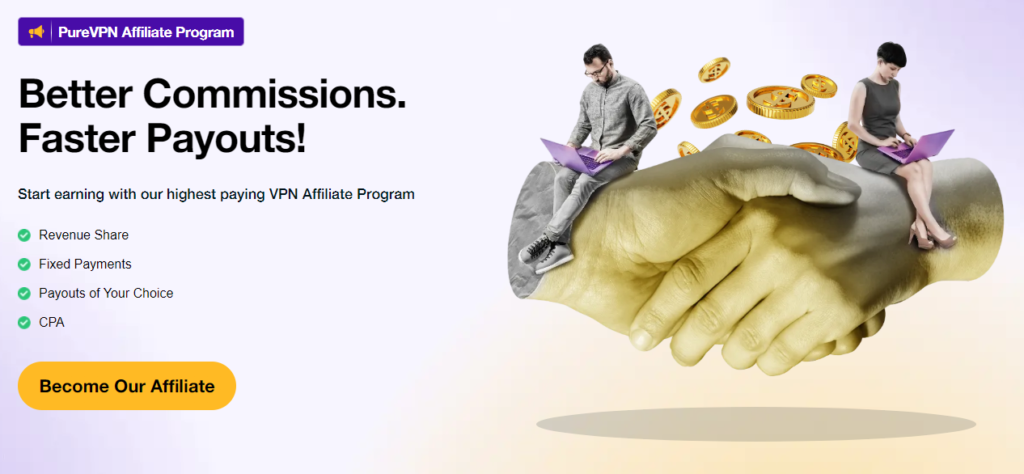Business
The TopRanked.io Weekly Digest: What’s Hot in Affiliate Marketing [PureVPN Affiliates Review]
We live in divided times. And yet, some things still unite Americans across the political divide. So, with it being the 4th of July and all, we thought we’d take a look at one such point of unity. Why? Because it’s something you can totally leverage to make some affiliate bucks. Just make sure you check out our PureVPN Affiliates review along the way if you really wanna monetize this.

It’s the 4th of July. And you’d think most Americans would know what that means.
But, apparently, there are some who don’t.
Anyway, whatever it is you’re getting up to today, please stay safe out there.

Oh, and speaking of staying safe, have you heard about this week’s top affiliate program?
TopRanked.io Affiliate Partner Program of the Week — PureVPN Affiliates
With it being 4th of July and all, it’s probably a bit late for me to go recommending affiliate programs to help people stay safe today.
And besides, I couldn’t find anyone selling common sense who also had an affiliate program.
Boo hoo.
But, that’s not to say you can’t help people stay safe year-round. Especially online.
And that’s where PureVPN Affiliates steps in.
Let’s take a closer look.

PureVPN Affiliates — The Product
There’s no secret about the product you’ll be promoting when you sign up with PureVPN Affiliates. Its a VPN… pure and simple.
But here’s the thing. With PureVPN Affiliates, you won’t just be selling some ordinary VPN. In fact, PureVPN Affiliates gives you direct access to one of the more powerful VPN networks out there right now.
Here’s a few highlights:
- The company behind PureVPN Affiliates was founded in 2007, so they’ve been in the biz for a while. Definitely a good sign.
- PureVPN gives users access to four modes to help them tailor their connection to their needs (streaming, privacy/security, etc.).
- PureVPN Affiliates let’s you promote a VPN with over 6500 servers in 78+ countries.
- You can totally use “torrenting allowed” as a selling point with PureVPN Affiliates (beause it is).
That all compares pretty favorably with other top VPN affiliate programs. But here’s the kicker — with PureVPN Affiliates, you’ll be selling one of the best-value VPN products on the market.
Now, I’m not going to compare all the plans and prices. But, to give you some idea, you can grab their base plan on a five-year deal for ~$130, which is dirt cheap.
Now, as for those of you wondering why you’d choose the dirt-cheap option over more premium options (which, you’d think, would pay higher commissions), there’s one thing worth considering. PureVPN Affiliates give you plenty of upsell options (like higher-tiered plans, add-ons like dedicated/residential IPs, etc.).
So in a way, you get the best of both worlds — you get the low-priced entry-level plans that’ll appeal to some users. Plus, you get the higher-priced stuff with more bells and whistles that’ll appeal to more premium users.
Basically, with PureVPN Affiliates, you’ll have one product to appeal to them all.

PureVPN Affiliates — The Commissions
Alright, let’s keep this short and sweet. Here’s the PureVPN Affiliates commission rates.
| Plan Type | First-Time Commission | Ongoing Commission |
|---|---|---|
| Monthly | 100% | 35% |
| Yearly | 40% | 35% |
| 2-Year | 40% | 35% |
Nice, right?
But that’s not all. With PureVPN Affiliates, you’ll also get:
- 90-day tracking cookies (yes, you read that right: 90-day cookies)
- Monthly payments with a $100 minimum payout threshold
- A $300 bonus after your first 10 non-monthly sales
What more do I need to say?

PureVPN Affiliates — Next Steps
So, you’re tempted by PureVPN Affiliates, but not 100% sure if you’re willing to commit just yet? Then why not head over to TopRanked.io and check out our in-depth PureVPN Affiliates review?
Alternatively, if you know a good thing when you see it, head here to sign up with PureVPN Affiliates today.

Affiliate News Takeaways
Chances are, this is the most divided era most of us have ever lived in.
If you need proof, then check out the ongoing Musk-Trump spat.
Somehow, we’ve gone from this:

To this:

And that’s why it warms my heart more than ever when we get to see a story that unites all sides of the political spectrum.
Here’s that story, as told with a right bias, and center bias, and a left bias.
And if you look at them all, they all pretty much agree that what Meta (and Yandex) did was bad. (If you missed the story/CBF clicking on the links, I’ll cover what Meta and Yandex did in a moment.)
In the Register’s case, we can sense their disgust right from the get go — why else would they refer to Meta as “Zuckercorp”? (That’s a pretty strong case of “editorializing” something for a news rag that’s usually pretty good at not “editorializing” stuff.)
Then, in the Verge’s case, we again see a similar judgement right from the get go when they accuse Meta of not “playing nice”.
And finally, in the case of Sky News… well, they try to be “objective”, but give away their bias based on the experts they speak to/quote — it’s all about how what Meta did was “very shocking”.
Beautiful, isn’t it!?
I haven’t seen this much unity amongst divided parties since… well… that day when men and squirrels finally agreed on something…

Anyway, useless random comments aside, this is basically what happened.
- Meta (and Yandex) apparently found a way to spy on Android users’ browser activity.
- The “hack” worked by using a clever little trick to make the browser talk to Meta/Yandex apps installed on the users device.
- When this happened, Meta/Yandex got to see exactly what websites you were visiting and exactly what time you were visiting. And yes, that means Zuckabot probably knows all about your weird Pronhub habits…

- …now, obviously, this was never meant to happen (apparently it violates the whole “sandbox” principle that’s supposed to isolate apps on your device).
- So now people are upset with Meta and Yandex and basically think they’re a bunch of jerks.
Anyway, that’s the basic story.
Now, curiously enough, this isn’t actually a fresh story. As best as I can tell, it actually broke about a month ago.
So why am I bringing it up now?
Well, because it didn’t exactly go viral at the time, but it seems to be enjoying a pretty long-tail, where more and more people keep discovering it over time.
In fact, I only just found out about it a couple of days ago myself…
Yeah, I know. I’m late to the party… but I do have an excuse…

Anyway, the point is, this story keeps doing the rounds, and that’s a good thing — it means there’s an actual news thing we can jump on that has a bit more than a few days of life in it (unlike the guy in the meme above…).
Now, where I’m going with all of this should be kinda obvious — this is a great little moment to leverage to get people to consider some privacy tools… cough… PureVPN Affiliates… cough.

But I also wanna take a look at a little data before telling you to dive headfirst into it. After all, there’s no point talking about all this privacy stuff if no one actually cares. I mean, it’s not that long ago that most people used to be all like “um, acshully, I don’t care because I’ve got nothing to hide…”

Although, fortunately, those days do seem to be behind us.
As for actual reliable data, the best I could find was courtesy of Pew Research, who last did a deep dive into the whole “do Americans care about privacy” thing in late 2023.
The key takeaway from that was that a growing number of people were increasingly concerned about their data, although some things might have subtly shifted since then.
For example, take this chart about people’s concerns about government use of personal data.

Somehow, I suspect dems have probably started trending up since then. And maybe republicans have started trending down somewhat… or maybe not.
Dems only trended down one percent over the time Biden was in office, so maybe there’s a similar thing happening with republicans. Maybe it’s a case of “once you’re concerned, it doesn’t really matter who’s in office anymore.”
Also, it’s not just governments snooping around their data that Americans care about. In fact, if there’s one thing Americans seem to hate more than the government on this issue, it’s private companies.

Damn.
That’s a big number — 81% of Americans are concerned about how companies are using their data.
I told you this was a story that united the masses.
Now let’s get to the good part of the report — the bit that tells you a bit more about how to sell privacy stuff to people.
Well, actually, it doesn’t tell you how to sell this stuff to people… but, it does drop a few hints that you can use.
First up, we have these stats:

First, pay attention to the second-last stat. Only 29% of Americans feel like “privacy is not that big of a deal”.
That means your total addressable market is basically 71% of the entire US adult population.
That’s a big market.
Also, pay attention to the bit about Americans trusting themselves to make the right decisions — 78% reckon they can make the right decisions.
What’s the takeaway from that stat?
Simple — you might have more luck in your marketing if you let users “discover” whatever it is you’re selling rather than telling them they need it.
After all, when you think you know what you’re doing, there’s nothing worse than someone telling you what you need to do. In fact, there’s a real psychological thing here called reactance — that instinctive pushback you feel when you’re confronted by prescriptive messaging.
If you don’t know the difference that I’m talking about here, take this as an example:
- You need to protect yourself from online threats by…
- You can enhance your protection against online threats by…
See the difference?
Good.
Anyway, let’s get back to the story because there’s another stat I wanted to look at.
Here’s the number of people (by percentage and split by age group) who have taken some pro-privacy steps.

Now, there’s a couple of key points here.
First, most people have gone to the effort of making at least one pro-privacy change. And that’s a good thing — it means people are at least willing to make some effort to protect their privacy. (Thus, they’ll at least be open to you selling them something that might require some effort… like you will be selling if you promote with PureVPN affiliates. 😉)
Second, and this is where we get back to messaging, I want you to take a look at the steps people have taken.
The grand majority have all changed their social media settings and turned off cookies.
But then, things taper off as you get more into the weeds.
Now let’s try combining some of that with the discovery-based messaging we were talking about before.
Why?
Because if you speak to an action someone has already taken, your messaging might just resonate with them.
Here’s an example:
- Turned off cookies? Nice move, but your browser might still be leaking…
And now let’s make it a little more timely and tie it back to our opening story — Meta/Yandex exploiting Android devices.
- Cookies off? Cool. Want to see what Meta did next?
Now you’ve got their interest, you just gotta reveal extra steps people can use to protect themselves — steps that go beyond blocking cookies — without being too prescriptive.
Takeaway
By the looks of it, Privacy’s a thing that’s here to stay. The slow burn, ongoing interest in the Meta/Yandex story’s the perfect example of this. And the research into people’s attitudes more than backs the thesis up.
Now, obviously, all that stuff that came at the end is just a hypothesis about how you could go about selling some privacy-related stuff to people. But, to be completely honest, I kinda like the hypothesis — there aren’t many people selling VPNs with discovery-based messaging.
Take this for example — one of the first articles I found when searching:

Notice how much prescriptive language is being used… “You should…”, “Your main concern should be…”, “You’ll need”.
Don’t tell people who already trust themselves what to think.
Let them discover it.
And then make sure they “discover” that link you found in the dashboard of your PureVPN affiliates account.

Closing Thought
That little spiel about discovery vs prescription reminded me of a Benjamin Franklin quote. (Which is particularly timely given the date.)
It does a little something like this:

Now, at first, you probably think this has nothing to do with personal development, which is what we usually talk about in the closing thought section.
And, you know what!?
You’re absolutely right.
But that doesn’t mean there’s not a deeper level to the quote.
Think about it like this. Let’s say you wanna learn more about affiliate marketing.
Chances are, the first thing you’re going to land on is some influencer yelling at you with some line like this:
- “You need to be doing this. When I did it, I 10xed my results.”
But then you dig a little deeper. Finally, you land on a slightly more thoughtful post from someone else:
- “These are the steps I used to 10x my results.”
And finally, you decide to go out and actually get involved. This time, you’re the one speaking:
- “Oh, now I get it. Tweaking this thing’s having a measurable impact on my results.”
Which of the three scenarios do you think you learned the most from?
The one where you were told what to do.
The one where you were taught what to do.
Or the one where you actually got involved.
Chances are, it’s the latter.
And speaking of the latter, if you are actually going to go out and get involved in something affiliate marketing related, please make sure you have a good affiliate program by your side. If you’re stuck for ideas, then why not take a look at PureVPN Affiliates?

__
(Featured image by SevenStorm JUHASZIMRUS via Pexels)
DISCLAIMER: This article was written by a third party contributor and does not reflect the opinion of Born2Invest, its management, staff or its associates. Please review our disclaimer for more information.
This article may include forward-looking statements. These forward-looking statements generally are identified by the words “believe,” “project,” “estimate,” “become,” “plan,” “will,” and similar expressions. These forward-looking statements involve known and unknown risks as well as uncertainties, including those discussed in the following cautionary statements and elsewhere in this article and on this site. Although the Company may believe that its expectations are based on reasonable assumptions, the actual results that the Company may achieve may differ materially from any forward-looking statements, which reflect the opinions of the management of the Company only as of the date hereof. Additionally, please make sure to read these important disclosures.

-

 Fintech1 week ago
Fintech1 week agoRuvo Raises $4.6M to Power Crypto-Pix Remittances Between Brazil and the U.S.
-

 Biotech7 days ago
Biotech7 days agoEurope’s Biopharma at a Crossroads: Urgent Reforms Needed to Restore Global Competitiveness
-

 Crowdfunding2 weeks ago
Crowdfunding2 weeks agoAWOL Vision’s Aetherion Projectors Raise Millions on Kickstarter
-

 Africa2 days ago
Africa2 days agoFrance and Morocco Sign Agreements to Boost Business Mobility and Investment















